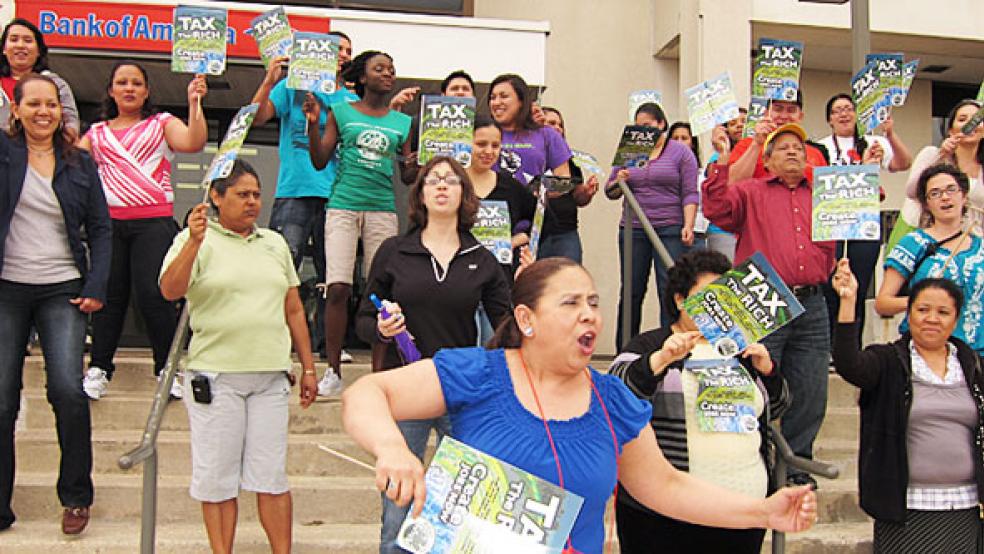Frustrated Americans came to the nation’s capital on Monday to demand that Congress and President Obama make corporations pay their fair share to the taxman. The rally, sponsored by MoveOn.org, called for supporters of the liberal organization to hold protests throughout the country. MoveOn, sponsored by two major unions, told members, “It's time to demand that everyone pays their fair share to rebuild the American Dream.” There was no mention that 47 percent of Americans pay no federal income taxes.
In one rally, more than 50 workers marched in front of a Bank of America in Arlington, Va., waving signs, shaking their hips, and chanting, “You’ve got to pay what you owe, time to give up that dough.” The colorful cheer and dance was nicknamed the “Tax the Rich Shuffle.” Groups of workers in seven cities nationwide performed the same ditty in front of Carnival Cruise Line headquarters in Doral, Fl., as well as at other Bank of America branches.
“Hearing on the radio and TV that large corporations really don’t pay taxes was something that made me go ’wow,’” said Mario Avalos, a 48-year old construction business owner and father of five in Alexandria, Va., . “I would certainly like to keep all of the money I make, but I pay, and to say that people who make millions and billions of dollars can play with rules and regulations to not pay that money isn’t right by me…especially when politicians are saying the country needs money.”
The top marginal corporate income tax rate for is 35 percent for income in excess of $18.3 million—but the effective tax rate is lower since it factors in deductions and credits including the widely used “accelerated depreciation credit,” which enables corporations to deduct machinery and equipment expenses. There’s also a deduction for domestic manufacturing.
In recent weeks, news reports surfaced about corporate giants like General Electric and Bank of America which successfully avoided paying federal taxes in 2010. The two firms reaped $3.2 billion and $1.9 billion in tax refunds respectively, by employing ‘tax’ teams of attorneys, accountants, and former Capitol Hill staffers to pour through the tax code to ensure the company pays the smallest tax bill possible, according to reports.
“The banks were bailed out, and continue to basically get bailed out paying little no taxes,” said Ingris Moran, a 19-year-old Sociology major at Northern Virginia Community College. “The people in our community and communities across the country pay their bills on time yet never seem to prosper and end up losing our homes and jobs.” He says that extra revenue would be better used to create jobs and avoid cuts to our education system.
Across town at another rally at the White House, thousands of mostly youth activists called on the president and Congress to push harder on renewable energy initiatives, which ironically was a major write off for GE, and to stop giving tax breaks and subsidies to large energy corporations like BP.
“Corporations know how to work the tax code to their advantage, that’s for sure,” said 26-year-old substitute teacher Montie Martin. “I look at my mom and dad and know how much they pay in taxes, and it feels wrong and almost dirty that my family is paying more than GE—especially when the debt is so high.”
The days’ events were heavy on anger and resentment, but light on specific recommendations or agreement on how to solve the tax and spending conundrum —a microcosm of what Congress and the president will spar over in the coming months. Though President Obama agreed to extend the Bush-era tax cuts for the top two-percent of earners for two years, the question of how to deal with the nation’s short and long term deficit looms large as a divided Congress gets ready to debate raising debt ceiling, establishing the fiscal 2012 budget, and overhauling the nation’s cumbersome tax code.
Some liberal lawmakers, like Jan Schakowsky of Illinois and Chris Van Hollen of Maryland have proposed raising tax rates for wealthy individuals, corporations, and scrapping numerous corporate tax breaks from the code. But the ideas are controversial and unlikely to be passed by the Republican-controlled House of Representatives.
“We’ve come from all across the country to be here and tell President Obama, we stood for you during the election, and now you need to stand for us and stop allowing tax subsidies to go to corporations that destroy our environment,” said Talya Tavor, a 21-year-old English major at Michigan State University. “What we’re asking for is not crazy.”
The protestors might be better served leaving corporations alone, said Curtis Dubay, a senior fellow at the conservative Heritage Foundation, who says he’s not sure these protesters realize that raising taxes on companies could cost them their employment. “I’m not sure these folks understand the consequences of what they are asking,” he said. “They would be much less likely to have a job. And if they do have a job, they will be paid less,” he said.
Related Links:
Tax Day 2011: We Need a Flat Tax More than Ever (FOX News)
Bachmann Tax Day Rally Draws Sparse Crowd (POLITICO)
Palin in Madison: Was That a Presidential Kickoff? (Anchorage Daily News)


